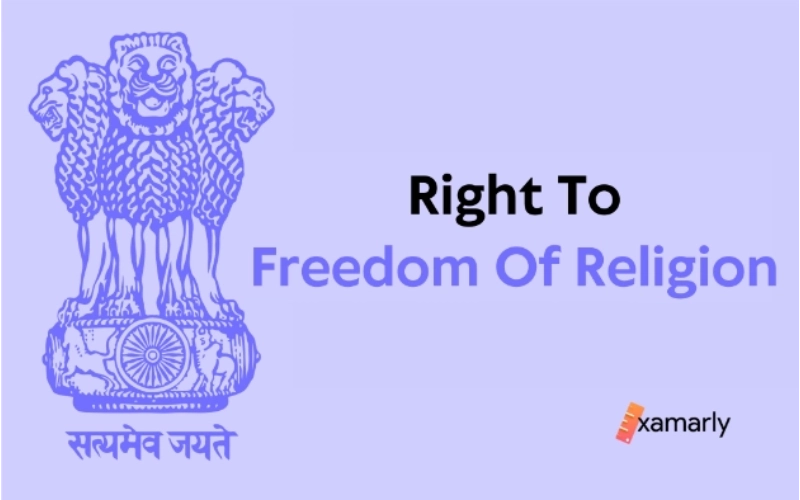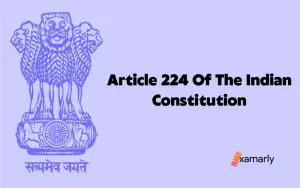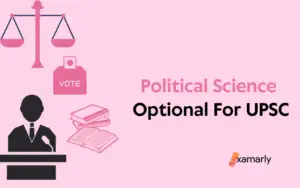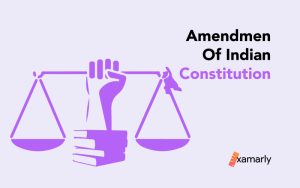Religion is an integral part of human life and has the power to shape our beliefs, values, and actions. It is a fundamental right of every individual to practice the religion of their choice without any interference from the state.
In India, the right to freedom of religion is protected under the Indian Constitution and is considered an inalienable part of the country’s democratic values. However, the implementation and interpretation of this right have been a source of debate and controversy in India.
In this blog, we will explore the right to freedom of religion in India and its significance in the Indian context. We will delve into the legal and constitutional provisions that safeguard this right and examine the ways in which it has been interpreted by the courts.
Furthermore, we will examine the impact of this right on society and the challenges that it poses to the secular fabric of the country.
- What Is Religion?
- What is "Right To Freedom Of Religion"?
- Right To Freedom Of Religion Under Article 25
- Right To Freedom Of Religion Under Article 26
- Right To Freedom Of Religion Under Article 27
- Right To Freedom Of Religion Under Article 28
- What Is Secularism?
- Case Studies
- Bijoe Emmanuel v. State of Kerala (The National Anthem Case)
- Ramesh vs Union of India, 1988 (Telecast of serial)
- Shifting of property linked to religion
- Shayara Bano vs Union of India (Triple Talaq)
- Commissioner of Hindu Religious Endowments, Madras vs Sri Lakshmindra Thirtha Swamiar of Sri Shirur Mutt
- D.A.V. College v. State of Punjab, 1971 (Teaching of Guru-Nanak)
- Aruna Roy v. Union of India, 2002 (Education for value development based on all religions)
- Conclusion
- FAQs Related To Right To Freedom Of Religion
- What is the right to freedom of religion in India?
- Is there a state religion in India?
- Can the government interfere in religious practices?
- Can a person change their religion in India?
- Can a religious organization be banned in India?
- Can religious instruction be given in public schools?
- Are there any laws that protect the rights of minority religions in India?
What Is Religion?
The German philosopher Immanuel Kant has a unique perspective on religion, as he defines it as “the recognition of all our duties as divine commands.” This means that for Kant, religion is not just about belief in a higher power, but also about understanding and fulfilling our obligations to ourselves and others.
Another way of understanding religion is through the perspective of American sociologist Milton Yinger, who defines it as “a system of beliefs and practices by means of which a group of people struggles with the ultimate problems of human life.”
This definition highlights the role of religion in providing guidance and meaning to individuals and communities as they navigate the complexities of life.
In terms of the law, the Constitution of many countries, including the US, does not provide a clear definition of the terms ‘religion’ and ‘matters of religion.’ This means that it is left to the courts to interpret and define these terms in a legal context.
The Supreme Court, in particular, plays an important role in determining the meaning of these terms in relation to the Constitution and the rights and freedoms of citizens.
What is “Right To Freedom Of Religion”?
The laws of many countries, including India, are designed to ensure that individuals have the freedom to practice the religion of their choice.
In India, this right is protected under articles 25 to 28 of the Constitution which guarantee every individual the right to freedom of religion. This means that individuals can practice their own religion without causing harm or disturbance to others.
The Supreme Court of India has interpreted this right to mean that being secular is neither pro-god nor anti-god and that it applies to individuals of all religious beliefs, including atheists and the devout.
This right is important in a country like India, where there is a rich diversity of cultures and religions. India has been home to many religions and castes for centuries, and people have been able to practice and nurture their own beliefs.
However, the freedom of religion is not absolute and there are certain restrictions on it. These restrictions include ensuring public health, morality, and order, promoting social reform, and advancing social welfare. Additionally, this right is subject to the remaining provisions of part 3 of the Indian Constitution.
Right To Freedom Of Religion Under Article 25
Freedom of conscience and free profession, practice and propagation of religion
(1) Subject to public order, morality and health and to the other provisions of this Part, all persons are equally entitled to freedom of conscience and the right freely to profess, practice and propagate religion.
(2) Nothing in this article shall affect the operation of any existing law or prevent the State from making any law—
(a) regulating or restricting any economic, financial, political or other secular activity which may be associated with religious practice;
(b) providing for social welfare and reform or the throwing open of Hindu religious institutions of a public character to all classes and sections of Hindus.
Explanation I.—The wearing and carrying of kirpans shall be deemed to be included in the profession of the Sikh religion.
Explanation II.—In sub-clause (b) of clause (2), the reference to Hindus shall be construed as including a reference to persons professing the Sikh, Jaina or Buddhist religion, and the reference to Hindu religious institutions shall be construed accordingly.
Article 25 of the Indian Constitution guarantees the right to freedom of conscience and the right to freely profess, practice, and propagate religion to all citizens. It ensures that all individuals have the freedom to practice their own religion without causing harm or disturbance to others, subject to public order, morality, and health.
The article also allows for laws to be made to regulate or restrict certain secular activities that may be associated with religious practices, and for laws to be made for social welfare and reform or for throwing open Hindu religious institutions of a public character to all classes and sections of Hindus.
Additionally, the article includes explanations stating that the wearing and carrying of kirpans shall be deemed to be included in the profession of the Sikh religion and that the reference to Hindus in clause (2) shall be construed as including a reference to persons professing the Sikh, Jaina, or Buddhist religion.
Right To Freedom Of Religion Under Article 26
Freedom to manage religious affairs
Subject to public order, morality and health, every religious denomination or any section thereof shall have the right—
(a) to establish and maintain institutions for religious and charitable purposes;
(b) to manage its own affairs in matters of religion;
(c) to own and acquire movable and immovable property; and
(d) to administer such property in accordance with law.
Article 26 of the Indian Constitution guarantees the right of every religious denomination or any section thereof, subject to public order, morality, and health, to establish and maintain institutions for religious and charitable purposes, manage its own affairs in matters of religion, own and acquire movable and immovable property, and administer such property in accordance with the law.
This means that every religious group has the right to establish and maintain their own institutions for religious and charitable purposes, manage their own religious affairs, own and acquire property, and administer that property according to the laws of the country.
Right To Freedom Of Religion Under Article 27
Freedom as to payment of taxes for promotion of any particular religion
No person shall be compelled to pay any taxes, the proceeds of which are specifically appropriated in payment of expenses for the promotion or maintenance of any particular religion or religious denomination.
Article 27 of the Indian Constitution prohibits any person from being forced to pay taxes, the proceeds of which are specifically allocated for the promotion or maintenance of any particular religion or religious denomination.
This means that no individual can be forced to pay taxes that will be used specifically for the promotion or maintenance of a certain religion. This guarantees the protection of the rights of individuals to not have to support religious institutions, practices, or beliefs to which they do not subscribe.
Right To Freedom Of Religion Under Article 28
Freedom as to attendance at religious instruction or religious worship in certain educational institutions
(1) No religious instruction shall be provided in any educational institution wholly maintained out of State funds.
(2) Nothing in clause (1) shall apply to an educational institution which is administered by the State but has been established under any endowment or trust which requires that religious instruction shall be imparted in such institution.
(3) No person attending any educational institution recognised by the State or receiving aid out of State funds shall be required to take part in any religious instruction that may be imparted in such institution or to attend any religious worship that may be conducted in such institution or in any premises attached thereto unless such person or, if such person is a minor, his guardian has given his consent thereto.
Article 28 of the Indian Constitution deals with the provision of religious instruction in educational institutions that are wholly maintained by the state.
According to clause (1), such institutions are prohibited from providing religious instruction.
However, clause (2) states that this provision does not apply to educational institutions that are administered by the state but have been established under an endowment or trust which requires the imparting of religious instruction.
Clause (3) ensures that no person attending any educational institution recognized by the state or receiving state aid shall be required to take part in any religious instruction or attend any religious worship unless they or their guardian have given their consent.
What Is Secularism?
Secularism refers to the separation of religion from government, as well as social, economic, and cultural aspects of life. It means that religion is considered a personal matter, and not something that should be intertwined with government or public affairs. India is a secular country, meaning that it does not have an official state religion.
However, the concept of secularism in India also means that all religions and faiths are treated with equal respect. This concept is deeply ingrained in the Indian Constitution, as it was added to the Basic Structure of the Constitution through the 42nd Amendment.
Secularism is highly valued in Indian democracy and has been a fundamental aspect of Indian culture for centuries, as evidenced by the coexistence of multiple faiths in the country. All religious groups in India have the same rights and are not subject to discrimination.
Models Of Secularism – Indian & Western
- The concept of secularism in India involves a separation of the state from religion, but in a different way than in the Western model.
- In the Western model, secularism means complete separation of the state from the Church, with both institutions not interfering in each other’s domains.
- In India, the state and religion are not completely separate, with the government having some limited influence on religious affairs.
- Unlike the Western model, the Indian state provides financial support to religious institutions and allows minorities to establish their own educational institutions.
- Many Hindu temples are directly governed by the state.
- The state also sets up Boards for the administration of large temples and the Waqf Board.
- In India, the term pluralism is more fitting than secularism when talking about society and community, as many religious groups have shared spaces and thrived together for centuries.
Case Studies
Bijoe Emmanuel v. State of Kerala (The National Anthem Case)
In a case involving three children from a sect called Jehovah’s Witnesses, the children refused to sing the national anthem “Jana Gana Mana” due to their religious beliefs. A commission was appointed to investigate the matter and found that the children were law-abiding and did not show disrespect.
However, the headmistress expelled the students under the instruction of the Deputy Inspector of Schools. The Supreme Court ruled that this expulsion was a violation of the children’s freedom of religion and their fundamental rights under clause (1)(a) of Article 19 and clause (1) of Article 25.
The court also stated that there is no law requiring anyone to sing the national anthem and that it is not disrespectful to stand respectfully without singing. In another case, the Supreme Court ruled that citizens must show respect for the national anthem, but exemptions are granted to disabled people and the playing of the national anthem in cinema halls is optional.
Additionally, Article 51A states that it is the duty of every citizen to show respect for India’s national anthem and other national symbols.
Ramesh vs Union of India, 1988 (Telecast of serial)
The “Tamas” serial was based on a book that had already aired four episodes depicting communal violence between Hindu-Muslim and Sikh-Muslim communities, including the tension, killing, and looting that occurred.
A writ petition was filed under Article 32 of the Constitution to prohibit the further screening of the serial and to enforce the petitioner’s fundamental rights under Article 21 and Article 25, as well as to declare the screening of Tamas as violative of Section 5B of the Cinematograph Act, 1952.
The Court, in dismissing the petition, ruled that there was no violation of Articles 21 and 25 and that the respondent had not acted improperly. The court acknowledged that the author of the book and the serial aimed to bring attention to the past history of the country and emphasize the desire of people to live in harmony and rise above religious barriers.
The court further held that when the serial is viewed as a whole, it creates an impression of peace and co-existence and that people are not likely to be affected by the violence depicted in it.
Shifting of property linked to religion
In the case of Gulam Abbas v. State of UP, there was a disagreement between the Shia and Sunni communities over the performance of religious rituals by the Shia on a specific piece of land in the mohalla Doshipura area of Varanasi.
To prevent conflicts between the groups and find a lasting solution to the issue, the Supreme Court appointed a 7-member committee, led by the Divisional Commission, with 3 members from the Shia sect and 3 members from the Sunni sect. The committee made recommendations for the relocation of Shia graves in order to separate the places of worship for the two sects.
The Sunni sect argued that these recommendations violated their fundamental rights of freedom of religion as outlined in Articles 25 and 26 of the Constitution. However, the court rejected these claims.
The Supreme Court ruled that the fundamental rights guaranteed under Articles 25 and 26 are not absolute and can be subject to public order. The court found that if it deemed the relocation of graves to be in the best interest of the public, the consent of the parties was not necessary, even if it went against Muslim personal law.
Shayara Bano vs Union of India (Triple Talaq)
Talaq-e-biddat, also known as triple talaq, is a form of divorce in which a Muslim man can divorce his wife by saying the words “talaq talaq talaq” three times. A five-judge bench of the Supreme Court heard a case regarding the controversial practice of triple talaq.
The main question at hand was whether Talaq-e-biddat (triple talaq) was a matter of faith to Muslims and if it was an integral part of their personal law. The court ruled, by a 3-2 majority, that the practice of Talaq-e-biddat was illegal and unconstitutional. The court also ordered that an injunction would remain in place, prohibiting Muslim men from practicing triple talaq until legislation was enacted for that purpose.
In response, the government formulated the Muslim Women (Protection of Rights on Marriage) Bill, 2017. Later, the Muslim Women (Protection of Rights on Marriage) Ordinance, 2018 was passed.
As the 2018 ordinance was set to expire, the government created a new bill in 2019 and an ordinance was passed. This was approved by the President and finally, the Muslim Women (Protection of Rights on Marriage) Act, 2019 came into effect on July 31st, 2019 with the goal of “protecting the rights of married Muslim women and prohibiting Muslim men from divorcing their wives by pronouncing talaq.”
Commissioner of Hindu Religious Endowments, Madras vs Sri Lakshmindra Thirtha Swamiar of Sri Shirur Mutt
In the case of Commissioner, Hindu Religious Endowments, Madras v. Sri Lakshmindra Thirtha Swamiar of Sri Shirur Mutt, the Madras legislature had passed the Madras Hindu Religious and Charitable Endowment Act, 1951, which imposed contributions under the Act.
The petitioner argued that the contributions levied were taxes and not fees, and that the state of Madras was not authorized to enact such a provision. The Supreme Court ruled that while the contribution levied was considered a tax, it was intended for the proper administration of religious institutions.
D.A.V. College v. State of Punjab, 1971 (Teaching of Guru-Nanak)
The validity of Section 4 of the Guru Nanak University (Amritsar) Act, 1969 was challenged in court on the grounds that it allegedly violated Article 28 of the Indian Constitution. The specific provision in question, Section 4, mandated that the state government provide for the study of the life and teachings of Guru Nanak Devji.
The argument was that since Guru Nanak University is funded entirely by the state, Section 4’s provision for the study of Guru Nanak’s teachings constitutes a violation of Article 28, which prohibits religious instruction in state-funded educational institutions.
However, the court ultimately rejected this argument, ruling that the study of Guru Nanak’s teachings as provided for in Section 4 is purely academic in nature and therefore cannot be considered religious instruction.
Aruna Roy v. Union of India, 2002 (Education for value development based on all religions)
A Public Interest Litigation (PIL) was filed under Article 32 of the Indian Constitution, in which the petitioner claimed that the National Curriculum Framework for School Education (NCFSE) published by the National Council of Educational Research and Training (NCERT) was violative of the provisions of the Constitution.
The petitioner argued that the NCFSE was anti-secular and was formulated without consulting the Central Advisory Board of Education, and therefore it should be set aside. The NCFSE provided education for value development, focusing on values such as basic human values, social justice, non-violence, self-discipline, and compassion.
The court ruled that there was no violation of Article 28 and that there is no prohibition on studying religious philosophy for having value-based life in a society. The court found that NCFSE is constitutional and not violative.
Conclusion
- In conclusion, the right to freedom of religion in India is a fundamental right guaranteed by the Constitution of India. However, this right is not absolute and is subject to certain reasonable restrictions imposed by the state in the interest of public order, morality and health.
- The Indian judiciary has played a crucial role in interpreting and upholding the right to freedom of religion. The Supreme Court has held that the state has a duty to ensure that the freedom of one religious group does not impinge upon the rights of others.
- Despite the constitutional guarantees and judicial interventions, religious discrimination and communal violence continue to be a major issue in India. There have been instances where the rights of minority communities have been violated, and they have been targeted on the basis of their religion.
- This has led to a lack of trust and confidence in the government’s ability to protect the rights of all citizens regardless of their religion.
- To ensure that the right to freedom of religion is upheld for all citizens, it is important for the government, civil society organizations, and individuals to work together to promote religious harmony and tolerance in the country.
- The government should take strict action against those who incite communal violence and discrimination and ensure that the rights of minority communities are protected. Civil society organizations should work towards creating awareness about the importance of religious tolerance and harmony.
- Individuals should strive to respect the rights of others and not discriminate against them on the basis of religion. Only by working together can we ensure that the right to freedom of religion is upheld for all citizens in India.
FAQs Related To Right To Freedom Of Religion
What is the right to freedom of religion in India?
The Indian Constitution guarantees the right to freedom of religion to all citizens, which includes the freedom to practice, profess and propagate any religion of their choice.
Is there a state religion in India?
No, India is a secular country and there is no state religion. The Indian Constitution guarantees equal rights to all religions and prohibits discrimination on the grounds of religion.
Can the government interfere in religious practices?
The government cannot interfere in the religious practices of individuals or communities, as long as such practices are not harmful to others or against the law. However, the government can regulate religious practices in certain circumstances, such as to maintain public order or to protect the rights of others.
Can a person change their religion in India?
Yes, every person has the right to freedom of conscience and the right to freely profess, practice and propagate their religion.
Can a religious organization be banned in India?
The government can ban a religious organization if it is found to be engaging in activities that are harmful to the public or against the law. However, such a ban would be subject to judicial review and the government would have to provide evidence to support the ban.
Can religious instruction be given in public schools?
Religious instruction is not allowed in public schools, as the Indian Constitution requires that public schools provide secular education. However, students can pursue religious education outside of school hours.
Are there any laws that protect the rights of minority religions in India?
Yes, the Indian Constitution includes various provisions to protect the rights of minority religions, including the right to establish and maintain institutions for religious and charitable purposes and the right to administer them.






